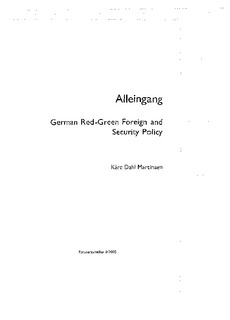| dc.description | When Gerhard Schröder was elected Chancellor in 1998, he underlined that German foreign and security policy would not change. When he left office in 2005, the traditional emphasis on close relations with the US had been broken, Poland no longer looked upon Germany as a close ally, and the country was no longer the engine of European integration. Instead, Germany had developed close links with Russia, and aligned itself with France. At the same time, Germany acquired a more active international security policy role. Defence reforms were initiated to provide for a growing number of foreign deployments for the Bundeswehr.
This study provides an analysis of German foreign and security policy under the Red-Green government. Particular attention is paid to the redrawing of German security policy, transatlantic relations, the relationships with Poland and France. | no_NO |
